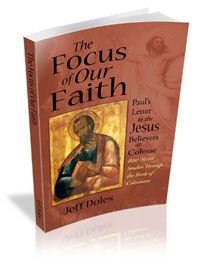As you therefore have received Christ Jesus the Lord, so walk in Him, rooted and built up in Him and established in the faith, as you have been taught, abounding in it with thanksgiving. (Colossians 2:6-7)
Paul wants the Jesus believers as Colosse to continue living according to who Jesus is: both Messiah and Lord. They have begun in that faith and now he wants them to “walk it out.”
Verse 7 elaborates. Paul speaks of being “rooted and built up.” Mixing these metaphors is not new for Paul, and that should probably tell us something about how important they are for our understanding. In Ephesians 3:17, he speaks of believers being “rooted and grounded in love.” In 1 Corinthians 3:9, he says, “For we are God’s fellow workers; you are God’s field, you are God’s building.”“Rooted” is an agricultural metaphor; “built up” is an architectural one. Craig Keener, in The IVP Bible Background Commentary says of this verse, “The Old Testament prophets used this language for Israel (if they obeyed God, they would take root, be planted, built up, etc.), and early Christians probably took this language from their preaching of the Old Testament.” Use of this kind of language identifies the New Testament Church along with obedient Old Testament Israel as the people of God.
We should pay attention to the tenses of these words, though they are not readily apparent in most English translations. Wuest’s New Testament: An Expanded Translation, however, captures them well: “having been rooted with the result that your are firmly established, and constantly being built up in Him and constantly being established with reference to the Faith.”
In the Greek text, the word for “rooted” is a perfect, passive participle. The perfect tense means that it is something that has already been done, with results that continue. The passive voice means that is some that has happened to us. God is the one who roots us in Jesus.
The Old Testament often spoke of the people of the Lord as being “planted.” For example, those who delight in His instruction are like trees “planted by rivers of water, that brings forth fruit in its season” (Psalm 1:3). In another psalm, the writer sings about God’s relationship with Israel, “You have brought a vine out of Egypt; You have cast out the nations, and planted it” (Psalm 80:8-9). The prophet Isaiah speaks of Messiah, who will come to comfort all those who mourn in Zion, “that they may be called trees of righteousness, the planting of the Lord, that He may be glorified” (Isaiah 61:3). This is the work of God in our lives.
In Colossians 2:7, the word for “built up” is a present, passive participles. The present tense, in Greek, speaks of a continuing process. Paul shifts metaphors with “built up,” which gives us a picture of construction. We are God’s building, “having been built on the foundation of the apostles and prophets, Jesus Christ Himself being the chief cornerstone” (Ephesians 2:20) But we are a particular kind of building: “in whom the whole building, being fitted together, grows into a holy temple in the Lord, in whom you also are being built together for a dwelling place of God in the Spirit” (Ephesians 2:21-22). We are God’s temple, being built together (not just as individuals but as God’s people) to be a dwelling place for Himself. Peter picks up the same theme in his letter, teaching us that we, “as living stones, are being built up a spiritual house,” with Jesus as the chief cornerstone (1 Peter 2:-6). Again, this is the work of God in our lives.
The word for “established,” bebaioo, is also a present, passive participle, indicating a continuing process. It is a word about firmness and stability, and it is used here of being stabilized in the faith. Not just “in faith” but “in the faith.” The content of faith is as important as the act of believing it, and the content Paul has in mind is the Messiah, Jesus, the Lord. The NIV translates bebaioo as “strengthened.” In stability there is strength. As we continue to “walk” in Jesus, we will become stronger in the faith, being strengthened by God. We will not be confused or wavering in faith, nor susceptible to those who would try to charm us away from Jesus.
“As you have been taught.” The believers at Colosse had received the good news about the Lord Jesus from Epaphras (Colossians 1:7). This is the same faith Paul taught, and it stands in sharp contrast to the message being brought by the Gnostic teachers and Jewish mystics who worshipped angels instead of Messiah.
Paul adds a thought about thanksgiving: “abounding in it [the faith] with thanksgiving.” Thanksgiving is about being appreciative for what one has received: in this case, the good news of Jesus the Messiah. Thanksgiving is important to the stability and strength of our faith, for what we do not appreciate we will eventually become discontent with and let go.

The Focus of Our Faith
Paul’s Letters to the Jesus Believers at Colosse
Bite-Size Studies Through Colossians
by Jeff Doles
Preview with Amazon’s “Look Inside.”
Available in paperback and Kindle (Amazon), epub (Google and iTunes) and PDF.






